വിവിധോപയോഗ ജല സേവനങ്ങള് (MUS)
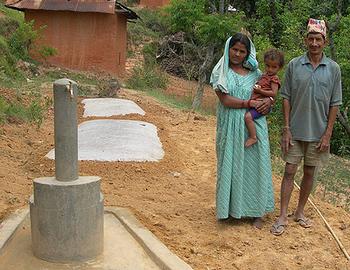
വിവിധോപയോഗ ജല സേവനങ്ങള് (MUS - Multiple-use water services) ജലസേവന രംഗത്തെ ഒരു നൂതന ആശയമാണ്. ദാരിദ്ര്യ നിര്മ്മാര്ജ്ജനത്തിനുതകുന്ന തരം മുതല്മുടക്കുകള്ക്കുള്ള സാധ്യതകള്ക്ക് വഴിതെളിക്കുന്നതോടൊപ്പം നഗരപ്രാന്ത പ്രദേശങ്ങളിലും ഗ്രാമപ്രദേശങ്ങളിലും സ്ത്രീ-പുരുഷ സമത്വത്തിനും വഴിയൊരുക്കുന്ന ആശയമാണിത്. ജനങ്ങള്ക്ക് വിവിധ ആവശ്യങ്ങള്ക്കായി വെള്ളം ലഭിക്കുന്ന തരത്തില് പുതിയ സംവിധാനങ്ങള് രൂപകല്പ്പന ചെയ്യുകയും, നിലവിലുള്ളവ മെച്ചപ്പെടുത്തുകയുമാണ് (MUS) ചെയ്യുന്നത്. ആഗോളാടിസ്ഥാനത്തില് , പൊതുവേ വെള്ളം ഉപയോഗിക്കുന്നവര് എല്ലാം തന്നെ വിവിധാവശ്യങ്ങള്ക്കായുള്ള ജലസേചനത്തിന് ഗാര്ഗിക സംവിധാനങ്ങളാണുപയോഗിക്കുന്നത്. അവ നിയമസാധുതയുള്ള സംവിധാനങ്ങളായിരിക്കാം, അല്ലായിരിക്കാം. ഇത്തരം വിവിധോപയോഗങ്ങളെക്കുറിച്ച് പദ്ധതി ആവിഷ്കരിക്കുക വഴി അടിസ്ഥാന സൗകര്യങ്ങള്ക്കു വേണ്ടിയുള്ള മുതല്മുടക്കിന് കൂടുതല് ഫലങ്ങള് ലഭിക്കും. അതോടൊപ്പം ആരോഗ്യം, ഗാര്ഹിക ജോലികളുടെ കഷ്ടപ്പാടുകളില് നിന്നും സ്വാതന്ത്ര്യം, ഭക്ഷണം, വരുമാനം, സ്ത്രീ-പുരുഷ സമത്വം എന്നീ കാര്യങ്ങളും മെച്ചപ്പെടും.
ആരോഗ്യത്തേയും, ഉപജീവനത്തേയും മെച്ചപ്പെടുത്തുന്നതും, നിലനിര്ത്താവുന്നതുമായ ജല സേവനങ്ങളോടുള്ള
ഒരു സമഗ്ര സമീപനരീതിയാണ് വിവിധോപയോഗ ജലസേവനങ്ങള്

പുരയിടങ്ങള്ക്കായുള്ള MUS: ആളൊന്നുക്ക് പ്രതിദിനം 50 – 200 ലിറ്റര് വെള്ളം
വീടിനരുകിലോ, പറമ്പിലോ, പരിസരപ്രദേശത്തോ ജലലഭ്യത ഉണ്ടായിരിക്കുമ്പോള് സാധാരണഗതിയില് ഗാര്ഹികാവശ്യങ്ങള്ക്കും ഉല്പാദനപരമായ ആവശ്യങ്ങള്ക്കും ആ വെള്ളമാണുപയോഗിക്കുക പതിവ്. ജലലഭ്യതയും ജലോപയോഗവും തമ്മിലുള്ള ഈ പ്രായോഗികമായ പരസ്പരബന്ധത്തെക്കുറിച്ച് മള്ട്ടിപ്പിള് യൂസ് വാട്ടര് ലാഡറില് പ്രതിപാദിക്കുന്നുണ്ട്. സാധാരണക്കാര്ക്ക് ജലലഭ്യത ഉറപ്പുവരുത്തുക എന്നതാണ് ഈ സേവനത്തിന്റെ ലക്ഷ്യം. പ്രതിദിനം ആളൊന്നുക്ക് 50 മുതല് 200 ലിറ്റര് വരെ വെള്ളം നല്കുമ്പോള്, അതില് 3 മുതല് 5 ലിറ്റര് വരെ സുരക്ഷിതമായ കുടിവെള്ളം ആയിരിക്കും. വരുമാനം ഉണ്ടാക്കിക്കൊണ്ട് പണം തിരിച്ചടക്കുന്ന വിവിധോപയോഗ സംവിധാന മുതല്മുടക്കിന്റെ കാലാവധി 3 വര്ഷമാണ്. പുരയിടങ്ങള്ക്കായുള്ള എം.യു.എസ്. പ്രധാനമായും സ്ത്രീകള്ക്ക് സഹായകരമായിരിക്കും. ഗാര്ഹികാവശ്യങ്ങള്ക്കുള്ള വെള്ളം കണ്ടെത്തുന്നതില് കൂടുതല് ഉത്തരവാദിത്തം വഹിക്കേണ്ടി വരുന്നതും അവര് തന്നെയാണല്ലോ. പുരയിടം മാത്രമുള്ള, ഭൂസ്വത്ത് കുറവായവര്ക്കും ഈ പദ്ധതി പ്രയോജനം ചെയ്യും.
സാമൂഹിക പരിമാണത്തിലുള്ള MUS: പ്രാദേശിക തല ഏകീകൃത ജലവിഭവ നിര്വഹണം
വീട്ടാവശ്യങ്ങള്ക്കും, ജലസേചനത്തിനും, മൃഗപരിപാലനത്തിനും, മരങ്ങള് വളര്ത്തുന്നതിനും, മത്സ്യം വളര്ത്തലിനും, ആഘോഷങ്ങള്ക്കും, പരിസ്ഥിതി സംബന്ധമായ ആവശ്യങ്ങള്ക്കുമുള്ള വെള്ളത്തിന്റെ വിവിധ ഉപയോഗങ്ങളെക്കുറിച്ചുള്ള സമഗ്രമായ സമീപനരീതിയാണ് എം.യു.എസ്. അവലംബിക്കുന്നത്. പുരയിടത്തിലും, വയലുകളിലുമായി മഴ, ഉപരിതല ജലം, ഭൂഗര്ഭജലം, ചതുപ്പു നിലങ്ങള് തുടങ്ങിയ വ്യത്യസ്ത ജലസ്രോതസ്സുകളില് നിന്നാണ് വിവിധ ഉപയോഗങ്ങള്ക്കായുള്ള വെള്ളം കണ്ടെത്തുന്നത്. പ്രാദേശിക തലത്തില് പ്രവര്ത്തിക്കുന്ന ഏകീകൃത ജലവിഭവ നിര്വഹണ സംവിധാനങ്ങള് ലാഭകരവും, സുസ്ഥിരവും ആയിരിക്കും.
| ഗുണങ്ങള് | ദോഷങ്ങള് |
|---|---|
| - ലിംഗഭേദമന്യെ സ്ത്രീകളുടേയും, പുരുഷന്മാരുടേയും ആവശ്യങ്ങള്ക്ക് തുല്യപരിഗണന - പൊതു പദ്ധതികള്ക്കും സ്വാശ്രയ പദ്ധതികള്ക്കും സാമ്പത്തിക മുതല്മുടക്കിനുള്ള സാധ്യതകള് വര്ദ്ധിക്കും.. |
- ജല മേഖലയിലെ മിക്ക പദ്ധതികളും വിവിധോപയോഗത്തിനനുസൃതമായി രൂപകല്പ്പന ചെയ്തവയല്ല. അതുകൊണ്ടു തന്നെ പദ്ധതി ആവിഷ്കരണം പലര്ക്കും അപരിചിതമായി തോന്നിയേക്കാം. - ചിലപ്പോള് വിവിധോപയോഗമെന്ന ആശയം യഥാര്ത്ഥ ജല പദ്ധതിക്കു പുറമേ ആയേക്കാം. അതിന് തടസ്സങ്ങള് നേരിടേണ്ടി വരുന്നതോടൊപ്പം "നിയമലംഘനം" എന്ന പേരില് പിഴയും ചുമത്താനുള്ള സാധ്യതയുണ്ട്. |
What does a multiple-use water service look like?
Once you understand the people, their needs and desires, and the sources, you can design an integrated water service with supporting health and livelihood components. How do you decide on the right combination of technologies and supporting programs?
1. Water: Multiple-use water services are not about just repeating the same technology throughout a community. Choosing the right technology can be an important part of creating a successful and sustainable service by enabling a community to use the right technology for the right uses. Equally important is choosing the right supporting programs (governance, management, and training), that will enable long-term sustainability of the water services.
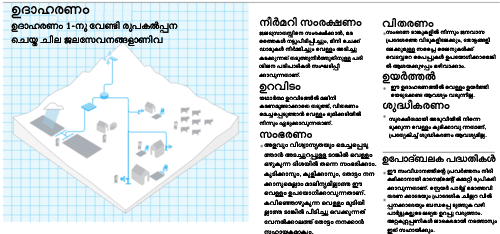
A key element of support programs is management. Work with water users to design a management structure that takes into account their resources and constraints. Some options for a management structure are community (management by committee or delegation to an entrepreneur or enterprise) or private (management by individual, household, or small group).
2. Health: By only providing potable water, you can make a health impact. To the extent that project resources permit, designing additional Health Activities (hygiene, sanitation, and nutrition) can maximize the overall health impacts of the new water service. Information learned in the Assessment process along with the results from the Design of Water Services can inform which Health Activities to include in the project.
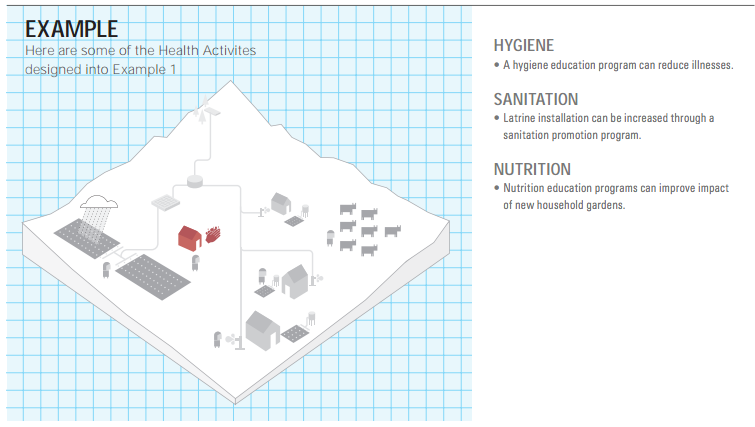
3. Livelihoods: Simply by providing holistic water services, livelihoods will be improved. To the extent that project resources permit, designing additional Livelihoods Activities (agriculture, livestock, trade) can broaden the impact of your project by increasing incomes and enabling access to opportunities like education.
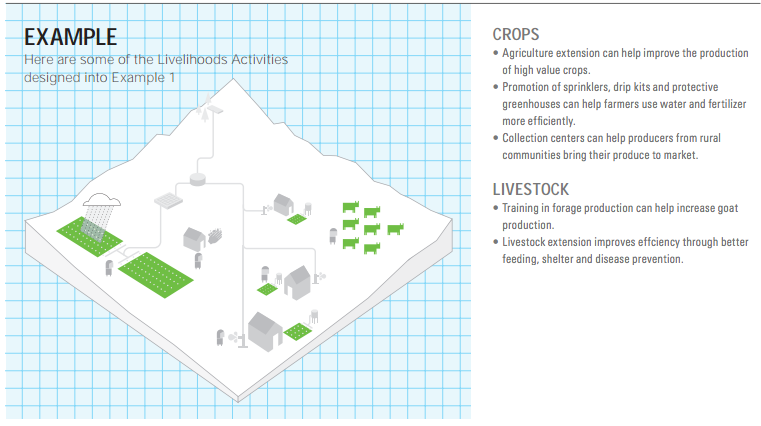
പ്രായോഗികാനുഭവങ്ങള്
In Nepal, multiple-use water systems were introduced by Nepal Smallholder Market Initiative (SIMI), International Development Enterprise (IDE), and Winrock. The systems consist of collection tanks at springs or small streams diversions, which deliver water to a reservoir near a village by gravity flow through a pipe. These systems serve 10-40 households, which use the water both for domestic purposes and horticulture. The introduction of drip irrigation systems ensured an efficient use of the water and better plant growth. Sixty percent of drip irrigation users apply water from the domestic system.
RSR പ്രൊജക്ട്
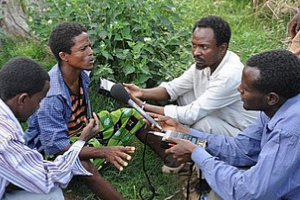 WASH Media Forum |
സഹായഗ്രന്ഥം, വീഡിയോ, ലിങ്കുകള്
- PDF: A Guide to Multiple-Use Water Services. Winrock International.
- Multiple Use Water Services Group.
Water System (MUS) Program |
with a rope pump |
- IWMI report - Multiple-Use water services to advance the millennium development goals.
- Alberts, H. and Van der Zee, J. J. 2004. A multi-sectoral approach to sustainable rural water supply: The role of the rope pump in Nicaragua, and Robinson, P. Mathew, B., and Proudfoot, D. 2004. Productive water strategies for poverty reduction in Zimbabwe. Both in: Beyond domestic. Case studies on poverty and productive uses of water at the household level. IRC Technical Papers Series 41.
- Polak, P. et al, 2004. Transforming access to rural water into profitable business opportunities. In Beyond domestic. Case studies on poverty and productive uses of water at the household level. IRC Technical Papers Series 41.
- Schouten, T.; Moriarty, P. 2003. Community water, community management – From system to service in rural areas. The Hague, The Netherlands: IRC International Water and Sanitation Centre and ITDG
- IWMI report - Multiple-Use water services to advance the millennium development goals.
- Nepal (SIMI) Smallholder Market Initiative. 2004. Process and impact study of the multiple-use (hybrid) gravity water supply schemes in Palpa and Syangja Districts of West Nepal. Kathmandu: Eco-Tech consult (P) Ltd. S.
- Winrock factsheet, SIMI
- Taking a multiple-use approach to meeting the water needs of poor communities brings multiple benefits. IWMI (2006)
കൃതജ്ഞത
- Models For Implementing Multiple-Use Water Supply Systems For Enhanced Land And Water Productivity, Rural Livelihoods And Gender Equity – Multiple Use Systems (MUS). Ongoing research - CIGAR.
- A Guide to Multiple-Use Water Services. Winrock International.
